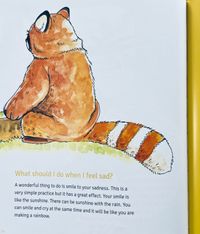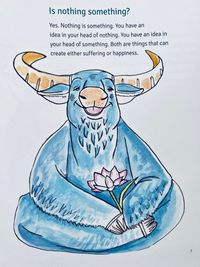"We forget how good it feels to walk on earth." Thích Nhất Hạnh's simple wisdom for life's most complex questions. For children, for everyone.
I keep a lot of personalities in my head. Not multiple souls like the impossibly imaginative Fernando Pessoa developed over his life, nor the multiple selves ballet dancer Nijinsky dissolved into during his last few decades on earth. No, I hold dear other people's personalities. Admittedly, these are imagined personalities; I've never met these people. But when the generous expansion of self pours on the page, as it does with all of the luminaries I gather on The Examined Life, it is impossible not to imagine the author. Like neurologist Oliver Sachs, who must be jovially loquacious about his beloved cephalopods; modern poet Marianne Moore, who quietly turns all conversation into bizarre metaphor; even ornithologist J. Drew Lanham, who casually ponders the changing breeding habits of whatever bird flew overhead; and then wonders off to follow said bird.
These spirits keep me company.
I read many books and occasionally read one that inspires me to purchase extra copies. The recipient is often dead—sometimes long dead- but does that matter?
Picking up an illustrated copy of Thích Nhất Hạnh's Is Nothing Something? a book that asks questions like why there are good days and why there are bad days - I immediately thought of Keats.
Yes, John Keats, the Romantic headcase of poets who, despite an incredibly short life, much of which was lived in death's antechamber, eeked out the most exquisite verse on the most intense anguish.
But when the melancholy fit shall fall
Sudden from heaven like a weeping cloud
That fosters the droop-headed flowers all,
And hides the green hill in an April shroud;
Then glut thy sorrow on a morning rose...
From John Keats's "Ode to Melancholy." Read full poem here.
Keats's "Ode to Melancholy," one of my favourites on such an overwrought topic, is as bright, diverse, deep, humble, and even hopeful. Buddhist teacher, monk, author, and reluctant world leader Thích Nhất Hạnh (October 11, 1926 – January 22, 2022) also addresses anguish with gentleness and brightness, including ones I've shared here: extinguishing explosive anger and the intimacy between solitude and gratitude and changing and embracing past pain. Is Nothing Something? is a book of questions asked by children with answers for everyone.
Why are there good days and why are there bad days?
We say, "Have a good day," to people because we want them to enjoy being alive that day. But sometimes things happen that we can't help. We may break or damage something. Someone may be mean or unfriendly to us. When these things happen, it's easy to forget to be aware of our breathing.
We forget how good it feels to walk on the Earth. Our minds can get stuck on the bad thing that happened and what is going wrong, and we forget what is good and what is going right. It helps to remember our mindful walking and mindful breathing. Our mindfulness is like magic that turns a bad day into a good one. When we remember to breathe and walk mindfully, it feels so good that our bad feelings just dissolve. There is a way to start the day and make sure it will be a good one right from the beginning. Before leaving home in the morning, you and your family can sit down together. If you have a bell, all of you can listen to the bell calmly. Then you can practice mindful breathing and say to yourself: "Breathing in, I calm myself; breathing out, I smile." If you start the day like this, your day will go better.


What should I do when I feel sad?
A wonderful thing to do is smile to your sadness. This is a very simple practice but it has a great effect. Your smile is like the sunshine. There can be sunshine with the rain. You can smile and cry at the same time and it will be like you are making a rainbow.

How do you know if somebody is a real friend?
It takes time. In everyone, there is a seed of loyalty, and there is a seed of betrayal. If we strengthen our own loyalty and are loyal to our friends, we will encourage them to be loyal as well. So instead of worrying whether the other person will betray us one day, we can help that person cultivate more loyalty, and he or she will stay with us and be our friend for a long time.
These answers accept the way things yet deepen our empowerment to affect change, even if it is merely acceptance of things we cannot change.

It is not the repression of emotions but their acceptance and, through that flood, their dissolution.
How can I remain calm when I see so many bad things in the world?
Whenever I see violence or cruelty, it still makes me angry. We all get angry sometimes. But we can learn to take care of our anger. If we look closely, we can notice that people who are cruel have a lot of suffering inside. When we see this, we can be compassionate and help the situation by creating peace, even if what is happening around us is not very peaceful. We can use our breath and our mindfulness to transform the energy of anger into the energy of compassion. When we have the energy of compassion, we can do a lot of things to help people suffer less.

The Zen Buddhist answers are questions that Thích Nhất Hạnh suggests he has been asked by children. The next one is particularly chilling and quite basic, no?
Why do I sometimes feel lonely and that no one loves me?
Sometimes the people around you are distracted and may forget to express their love. But if you feel like no one loves you, you can always look outside at the natural world. Do you see a tree out there? That tree loves you. It offers its beauty and freshness to you and gives you oxygen so you can breathe. The Earth loves you, offering you fresh water and delicious fruit to eat. The world expresses its love in many ways, not just with words.

And then there are questions that we cannot imagine anyone asking merely fifty years ago, which, of course, anticipates what questions our children's children will ask of them. Will the Zen answers be equally fulfilling?
Why do we have to recycle things? Can't we just throw them away?
We don't want this beautiful planet to become a mess. We have to preserve the beauty and freshness of this planet so that the children who will be born later will also be able to enjoy it and not be surrounded by garbage and by air that is hard to breathe. Your anger and jealousy are also like garbage. With mindfulness, we can recycle these strong feelings and transform them back into friendship.

This next question is my particular favourite. It is very simple in its intention, almost common. My first year writing The Examined Life was busting with questions about where dead people exist to the living and how we store memories in objects to keep the past and ourselves alive. It must be a question we have all asked at one moment or another.
I love my grandfather, but he died. How can he still be with me?
If your loved one isn't there in his familiar form, look for him in his new forms. A kernel of corn grows into a corn stalk, and the stalk makes an ear of corn, which contains new kernels. Your grandfather is like the original corn kernel and you are the new corn kernel. In this way, you are his continuation. Your grandfather is still alive in every cell of your body. You can have as many conversations with him as you want.
Obviously, offering this book to Keats or anyone at their most destitute would be a bit silly. I imagine the glib advice would slide off the poetic persona like ink on metal. But there is a humanity in the pause it takes to read these words, to understand that others - in this case, children - have asked the same things. That in our hearts, we all wonder sincerely about the same things. And none of us have a definite, question-crushing answer, merely imagined spirits to keep us company.

